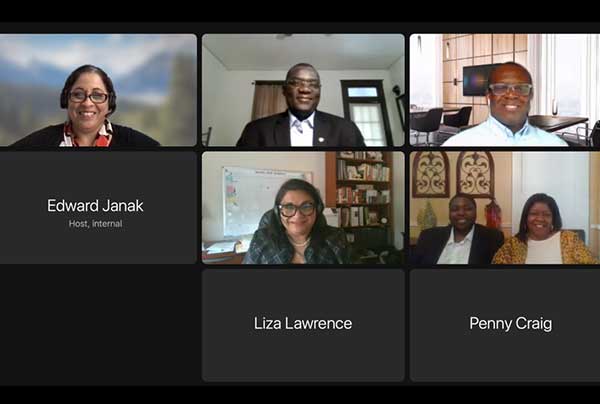Faculty and Doctoral Students Present at the International Society for Educational Biography
 Sandra Guzman-Foster, PhD, associate professor, Jeff L. Neal, Patrick Tumwine, Deborah A. Quinones, Doletha J. Thomas and Christopher B. Thomas, doctoral students in the Graduate Studies Program at the Dreeben School of Education, presented at the 37th Annual Conference of the International Society for Educational Biography (ISEB) in partnership with the Society of Philosophy and History of Education (SOPHE) Conference. ISEB is an organization dedicated to the exploration of biography in writing, teaching, research and other professional endeavors.
Sandra Guzman-Foster, PhD, associate professor, Jeff L. Neal, Patrick Tumwine, Deborah A. Quinones, Doletha J. Thomas and Christopher B. Thomas, doctoral students in the Graduate Studies Program at the Dreeben School of Education, presented at the 37th Annual Conference of the International Society for Educational Biography (ISEB) in partnership with the Society of Philosophy and History of Education (SOPHE) Conference. ISEB is an organization dedicated to the exploration of biography in writing, teaching, research and other professional endeavors.
Presentations:
The Fabric of America; Sutured with Stories from Trauma and Experiences of Two Scholars
Jeff L. Neal and Sandra L. Guzman
This session discussed the impact of George Floyd’s death and the necessary elements for healing, solidarity and unity. Jeff Neal explained, “The conference provided a means to tell my story with scholars I have studied with for more than three years, if not more. Projecting the diverse and collective scholarship we share at UIW. In particular, we as a people of brown and black pigmentation are amongst the elite in higher education. Clearly, we are a journey to the mountain top!”
Embracing Vocational Education: A Cursing and a Blessing
Patrick Tumwine and Sandra L. Guzman
This session discussed the role of vocational education as an element of intersectional identity development. Patrick Tumwine shared, “The recent International Society for Educational Biography (ISEB) conference taught me that our personal stories play a big role in defining who we are and that the kind of attention we pay to these stories shapes the path we choose to take. I learned that my ability to transform the world around me begins with my inner self-transformation. It is through interrogatively telling my own story that will help trigger the needed impactful, positive relationship we all yawn for in the world. As I listened to others share their stories of compassion and transformation, what came to mind was that it is what we remain with after listening with our hearts that helps to define who we are.”
College Remediation: Where it Begins and Continues
Deborah A. Quinones and Sandra L. Guzman
This session discussed the intersection of remediation and minoritized populations on university campuses and how remediation can serve as a tool of inclusion. Deborah Quinones said, “I am happy to share my thoughts as a participant in the recent International Society for Educational Biography (ISEB) conference. It is such platforms that provide opportunities to know more from others' stories. For far too long words and stories have been hijacked and misappropriated to tell a narrative that barely reflects one's truth. To emancipate the stories that are seldom told, and are nearly never heard, is long overdue. I learned that if we do not tell our stories from our lived truths then the narrative is not ours to own. There is a sense of responsibility to those who come behind and deserve to know. Through our stories, no matter how sweet (or unsweet) the sound, can the lost become found and true transformation begin to reflect an illuminated inclusive land.”
Duoethnography of Two African Americans’ Educational Journey through COVID-19 and the Political Tensions of 2020: A Mother-Son Experience
Doletha J. Thomas and Christopher B. Thomas
This session discussed the duoethnography of two African Americans’ educational journeys through COVID-19 and the political tensions of 2020. Doletha Thomas shared, “To quote the wisdom of Maya Angelou, ‘There is no greater agony than bearing an untold story inside you.’ Participating in the International Society for Educational Biography (ISEB) conference provided a space for us and other colleagues to share our untold stories. It was especially meaningful for me because it was a powerful legacy moment. It was an honor and privilege to present with my son, not only as his mom but also as his colleague and friend. Duoethnographic research is a transformative form of inquiry that requires from each researcher trust, honesty, critical self-reflection and unwavering respect for each other’s perspectives. It has been an absolute joy to experience this methodology with him as we learn more deeply about ourselves and each other. Our individual story has value. The story of others has value. The conference offered a snapshot of the power of untold stories. It is imperative to the health of individuals, academia and society that these stories do not remain untold.”
“The conference was a great opportunity to present the research my mom and I are working on together. At first, I was nervous about presenting in front of doctors and doctoral students including my mom. However, everyone was very supportive and patient. I felt welcome and a part of the conversation. When it came time to explain how we handle our stressful experiences while also focusing on academics. I suppose I can say that I was learning about the importance of our research in real-time. Listening to the other presenters, I felt more relaxed because I was so interested in their stories. I was ready to share my own story. I could relate to some of the challenges that they have experienced. They could have allowed their challenges to hinder their success, but they used them as motivation to press on. My experience from the conference gives me more confidence as I begin my new career,” said Christopher Thomas.
